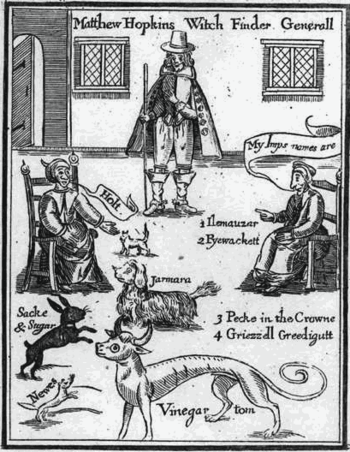| Frontispiece from Matthew Hopkins' The Discovery of Witches (1647), showing witches identifying their familiar spirits (Photo credit: Wikipedia) |
In case you have not been following the situation, it seems that some legal questions have been raised by blogger Matthew Hopkins, who uses the handle "The Witchfinder." The central question seems to involve whether those who have been placed on "an enormous public blacklist" where they have been labeled in all sorts of awful ways might have legal recourse, at least in the U.K.
Shortly after this post appeared, I saw several tweets suggesting that the Block Bot had either ceased operations completely, been replaced by a similar service, or was still going strong. Everybody seemed to agree that something dramatic had happened, but few could agree on what it was. At the time I am writing this, the Block Bot appears to still be active.
About that time, James Poulos (The Daily Beast) suggested that the Block Bot might "save the Internet," reasoning,
We’d never let a mob of insufferable people—much less those at odds with our very existence—into our homes, or even into public and semi-public areas we frequent, like churches, restaurants, or parks. Instead of clinging to the unreasonable expectation that people impose the same self-restraint online that they still mostly do in real life, we need to accept the ’net for what it is and accept a new modus operandi.And a few days later, Allum Bokhari (Breitbart) reached a decidedly different conclusion, referring to the Bot as "progressive McCarthyism" and noting,
Lulled into a false sense of security by the adulation of metropolitan progressives who quickly lost interest in them, the creators of the Block Bot truly believed they were not doing anything wrong. They completely failed to see the problem in creating a list of “abusers and bigots” before adding all their political opponents to it and spreading it across the internet. For a group that consider themselves part of a sceptic elite-within-an-elite, the oversight is almost laughable.I use Twitter quite a bit, and I am still trying to figure out what is so difficult about unfollowing or blocking people with whom one does not want to interact.
Where Poulos' argument falls down for me is that those who use the Block Bot are engaging in preventative blocking. They are not blocking someone in response to something they tweeted; they are relying on someone else's judgment that those on the list might do something they wouldn't like in the future. And when this judgment turns out to be as flawed as it appears to be (e.g., President Obama was on blocked at one point) or to rest with people who behave like this, it is difficult to have any confidence that the blockers have the best interests of those who use the service in mind.
